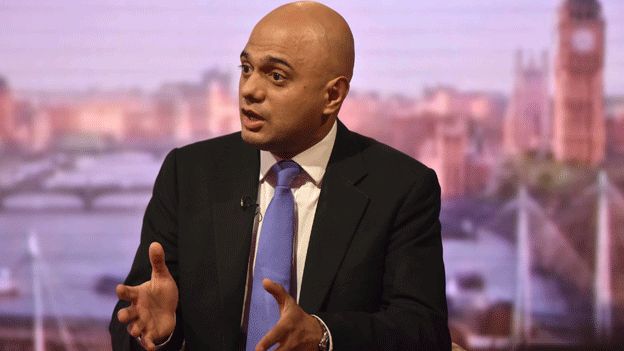Tax credits change 'key to EU renegotiation'
- Published

Limiting the rights of EU migrants to claim tax credits is a key part of the renegotiation of Britain's relationship with the EU, Sajid Javid has said.
The business secretary said ministers wanted to change rules that allowed EU migrants to receive £700 a month in tax credits - twice what Germany paid.
He told the Andrew Marr Show: "That's the kind of thing we need to change. It's a key part of our negotiation."
Labour's acting leader Harriet Harman said she also backed a rule change.
Prime Minister David Cameron, who is due to hold talks with European Commission president Jean-Claude Juncker for talks on Monday, has pledged to renegotiate a "better deal" for the UK and hold an "in/out" referendum by the end of 2017.
'Patience needed'
Mr Javid told Andrew Marr he was confident the government would achieve the new deal it wants as the election of a Conservative government had concentrated the minds of Britain's EU partners.
"We are going to need some patience but we will get there," Mr Javid said, especially on getting changes to things like the welfare payments available to new arrivals from elsewhere in Europe.
Mr Javid said EU migrants could currently receive £700 per month in tax credits, twice what they would receive in Germany. He said "that's the kind of thing we need to change. It's a very key part of our negotiation."
Ms Harman, who confirmed that Labour would now back the EU referendum bill, which paves the way for the vote by the end of 2017, said Labour supported government plans to reform welfare so people contributed before they were able to take something out.
She denied it was inconsistent to support efforts to renegotiate terms but also say that the party would back staying in the EU whatever the result of those negotiations.
Mr Cameron is in the middle of a diplomatic push on his plans to change the terms of the UK's membership of the EU.
He said on Friday he was confident he could get a better deal for the UK but conceded that it "won't be easy".
Speaking at an EU summit in Latvia, he said he had not been greeted "by a wall of love" when he met EU leaders for the first time since his general election win.
But he said he had a mandate and the "British people at his back" for the changes he wanted to achieve.
As well as talks with Mr Juncker, the prime minister will also hold talks with Angela Merkel and French President Francois Hollande in coming days.
'Compromise' sought
Other EU countries have said they will listen to what the UK has to say, the Finnish prime minister Alexander Stubb saying he backed the UK's proposals to cut red tape and was sure "some kind of compromise" could be reached.
But some member states have questioned the need for any change to EU treaties, something Mr Cameron has said he wants to see, and ruled out any watering down of the key principle of freedom of movement.
Speaking at Friday's meeting of EU leaders, Mr Cameron said he believed it was in the interests of both the UK and its European partners for the UK to remain part of the European Union but under different terms.
The British people, he said, were not happy with the status quo and wanted change on issues such as welfare, immigration and an opt-out from further integration.
Mr Cameron is committed to holding an in/out referendum on Britain's membership of the EU by the end of 2017, but there is speculation it could be held next year to avoid a clash with elections in France and Germany.
EU referendum in focus
David Cameron is ready to start renegotiating the terms of Britain's EU membership ahead of a referendum. Here is some further reading on what it all means:
Legislation paving the way for the UK referendum is expected to be published next Thursday, the day after the Queen opens Parliament.
Asked whether he would be prepared to recommend a UK exit if he did not get the outcome he wanted, Mr Cameron said he would "not rule anything out".
Mr Cameron has not revealed the full details of what he is seeking from any changes, but he is expected to demand an opt-out from one its core principles of forging an "ever-closer union" between member states.
He will also try to get more powers to block or opt out of new EU laws, and for restrictions on welfare benefits for migrants until they have lived in the UK for four years.
This week, a number of UK business leaders started to highlight the potential implications of the referendum, with the president of the CBI saying businesses should "speak out early" in favour of remaining in a reformed EU,
The Labour Party, SNP, Plaid Cymru and the Lib Dems favour staying in the EU. UKIP, which got almost four million votes but only one MP in the election, want to leave.
- Published30 December 2020
- Published24 May 2015
- Published17 February 2016
- Published22 May 2015
- Published21 May 2015
- Published21 May 2015
- Published21 May 2015